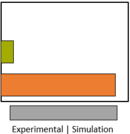Research
Depending on the target molecule and the application goal, several successive process steps are required for the isolation and purification of the end product in downstream processing. For an efficient process, the initial product concentration, which in the last few years has been growing steadily in biotechnological synthesis, is an important parameter. However, this leads to more and more limitations with conventional downstream processing methods, such as chromatography, filtration and extraction. The capacities and selectivities towards the target molecule are not sufficient enough to time- and cost-efficiently process the target molecule in a few steps. Depending on the number of steps or yield per step, the total product costs are therefore determined up to 50-80% by the downstream processing alone.
The objective of the specialist area for selective separation technology is to pursue new approaches in the field of bioproduct processing. To this end, new materials are developed and their interactions investigated in a fundamentally oriented manner. New process engineering approaches are also pursued and reviewed in the context of the overall process.
Scientific focus

Development and optimization of affinity matrices for antibody purification
Antibodies are among the most important biotechnologically(...)

Process Development for High-Gradient Magnetseparation
Proteins from dairy products are Using magnetic separation for protein purification from dairy(...)

Simulation of a capacitive electrode in bioseparation
Fundamental knowledge about hydrodynamics as well as electrochemical and adsorptive phenomena facilitates the(…)

Separation and Dewatering of Microalgae
Microalgae are a sustainable source of nutrients and other valuable biotechnological products. The aim of the(...)

Separation of biomolecules by magnetic nanoparticles
Downstream processes continue to be a challenge to isolate target molecules selectively from the fermentation broth. The(...)

Peptide binding and release: Combining drug delivery and protein purification
Super magnetic nanoparticles can be variously used and are from a special interest in the(...)

Magnetic millifluidic fractionation of a heterogeneous yeast cell culture
Yeast are single-cell fungi, which are used in different fields,(...)
Development of an Innovative Process for the Purification of Plasmids and Nucleotides
Therapeutic plasmids and nucleotides are of increasing importance (...)
Process development for preparative purification of macromolecules by high-gradient magnetic separation
As an alternative to conventional techniques (...)

Scale-up: Synthesis of magnetic nanoparticles at pilot scale
Magnetic nanoparticles (MNPs) are used (...)

Development of an affinity-based separation process
The goal is to develop an affinity-based (...)

Growth factor purification strategies for the production of cultivated meat
(...)

Process intensification within the biopharmaceutical industry
Process intensification in the biopharmaceutical industry (...)

Basidiomycete-mediated bioprocesses
This project focuses on identifying industrially interesting proteins (...)

Circular Economy: Downstream Process Development
acing the dual challenges of a rapidly expanding global population (...)
